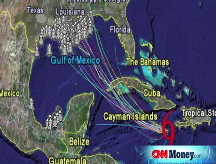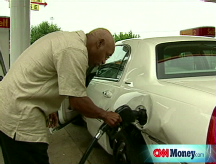Oil closes lower, despite storm
Gustav lurks near Gulf of Mexico, but crude prices still sink on a strengthening U.S. dollar.
| Special Reportfull coverage |
 |
NEW YORK (CNNMoney.com) -- Despite Hurricane Gustav's threat to infrastructure in the Gulf of Mexico, oil prices fell from an earlier rally Friday as the dollar gained traction against the euro.
U.S. crude for October delivery fell 13 cents to settle at $115.46 a barrel. Prices were higher earlier as investors braced for the storm, which is expected to make landfall in the U.S. on Tuesday morning.
Oil rose as high as $118.76 during Friday trading as Gustav bore down on the Gulf, but then pulled back as the dollar gained strength against the 15-nation euro.
Dollar rises: The dollar gained against the euro after a Chicago Purchasing Managers Index report showed an unexpected increase in manufacturing activity around the Chicago area.
A University of Michigan report also showed a better than expected rise in consumer sentiment.
The two reports lessened the impact of a reported decline in personal income, which signaled that the effects of the government's $90 billion stimulus program were drawing to an end.
The decline in personal income also indicates that consumers may not have money to pay for a lot of expensive petroleum-based fuel, which pulled oil down as well.
Additionally, oil is traded in dollars, so a stronger dollar makes oil more expensive for foreign investors. As the dollar rises, many who purchase commodities as a hedge against inflation transfer their money into other markets.
The dollar rose against euro Friday, but fell against the Japanese yen.
Gustav bears down: Oil prices lost traction despite projections that Hurricane Gustav will to enter the Gulf on Sunday. Some models show the storm could reach Category 4 strength before it reaches Cuba, according to the National Hurricane Center.
Royal Dutch Shell (RDS), ExxonMobil (XOM, Fortune 500) and ConocoPhillips (COP, Fortune 500) were among the oil companies prepared to evacuate major offshore rigs Friday.
Facilities in the Gulf account for about 25% of U.S. oil production. Offshore platforms and pipelines buried in the sea bed are vulnerable to extreme storms such as hurricanes.
Just three years ago, hurricanes Katrina and Rita devastated oil facilities before battering the Louisiana coast. The storms, which reached Category 5 strength before making landfall, destroyed 113 offshore oil and natural gas platforms and damaged 457 pipelines in 2005.
Oil companies are shutting down production and oil traders are hedging their bets ahead of the weekend, according to Karen Matusic, spokeswoman for the American Petroleum Institute.
"Even if the storm doesn't hit, you're going to get companies evacuating the rigs for precautionary reasons," she said.
Storm upgrades: Oil companies have tried to improve the storm resistance of offshore rigs and pipelines since Katrina and Rita.
Drilling rigs and production platforms moored to the sea floor in the Gulf had been attached with eight lines, and are now required to be moored with 12 to 16 lines. Pipelines are now required to be buried deeper beneath the sea floor.
"That's one reason the response to this storm has been somewhat muted so far," said Jim Ritterbusch, president of oil advisory firm Ritterbusch and Associates.
The new safety measures should make facilities much more resistant to storm damage, but Gustav would be their first real-world test.
"There's concern for the offshore platforms," said Michael Lynch, president of Strategic Energy & Economic Research, Inc. But the biggest concern is "power loss at some facilities," he said.
If the storm disrupts electricity, the platforms may be unable to operate. However, facilities are generally better equipped to handle power outages now than they were in 2005, according to Lynch.
"The biggest risk is that you get the major loss of a natural gas processing facility," said Lynch. Fluctuations in natural gas prices can also affect crude oil, since both are used in similar applications such as home heating.
On Thursday, Gustav sent crude prices as high as $120.50, although prices later fell in part because of a report that there was a large increase in natural gas supplies.
If the storm does make a direct hit on Gulf facilities, the Energy Department said Thursday it was prepared to release supplies from the government's 700 million barrel Strategic Petroleum Reserve to cushion the blow. ![]()



